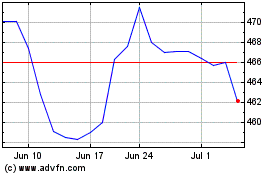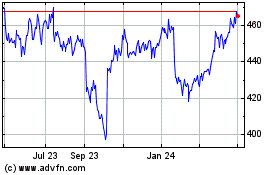By Chun Han Wong
BEIJING -- China said it would sanction any U.S. firm involved
in a planned $8 billion sale of advanced jet fighters to Taiwan, in
retaliation against what it describes as Washington's attempt to
undermine Chinese national security.
Beijing's countermeasure against the proposed sale of 66 F-16V
fighters isn't expected to have much impact on the manufacturer,
Lockheed Martin Corp., but it could complicate efforts to resolve
the U.S.-China trade dispute.
"China will take all necessary measures to safeguard its
interests, including the imposition of sanctions against the
American companies that participate in this arms sale to Taiwan,"
Chinese Foreign Ministry spokesman Geng Shuang said Wednesday.
Beijing considers the self-ruled island of Taiwan as part of its
territory and refuses to rule out achieving unification by force.
China repeatedly has criticized U.S. arms sales to Taiwan as
harmful to its sovereignty.
If Washington goes through with the F-16V sale, all of the
ensuing consequences must be borne by the U.S., Mr. Geng said,
without elaborating.
U.S. and Chinese officials have been discussing new rounds of
talks, expected to be held next month in Washington, to resolve the
countries' ongoing trade dispute. Some Trump administration
officials have grown concerned in recent months that
national-security disputes with China, including arms sales to
Taiwan -- a separate $2.2 billion proposed sale of tanks, missiles
and other military hardware was approved in July -- are souring
efforts to secure a trade deal.
Congress was formally notified of the proposed F-16V sale on
Tuesday after the State Department gave its approval. Several
Republican and Democratic lawmakers, who were informally briefed on
the proposal last week, have expressed support, calling it a vital
move to deter Beijing from interfering with Taiwan's democracy.
When the proposed tank-and-missile deal was approved last month,
China made a similar sanction threat against any U.S. company
involved in the sale.
Sanctions are expected to have only a minimal effect on U.S.
defense companies since they are broadly barred from making
military sales to China, though Lockheed Martin has sold civilian
helicopters to Chinese buyers through its Sikorsky Aircraft Corp.
unit. A spokeswoman for Lockheed Martin referred queries to the
State Department.
A State Department official said the department "will closely
monitor any actions that would unfairly disadvantage U.S. firms and
urge the Chinese government to refrain from imposing its political
views on U.S. and foreign companies." The official said the U.S.
policy regarding arms sales to Taiwan, which has remained
consistent across administrations, has helped to maintain stability
in the region.
From Beijing's perspective, Chinese experts say, the arms deal
represents a statement of intent by Washington about maintaining
influence in Asia, rather than an effort to tilt the military
balance between China and Taiwan, which greatly favors the
mainland.
"The U.S. wants to demonstrate its dominance over the
Asia-Pacific region," said Shen Dingli, an international-relations
professor in Shanghai. "It's an act of political provocation."
Under the 1979 Taiwan Relations Act, Washington is committed to
selling defensive weaponry to Taipei, though the U.S. has in the
past turned down Taiwanese requests for new F-16s and other
advanced arms for fear of angering China. The law also commits the
U.S. to treat threats to Taiwan as a matter of "grave concern,"
without specifying how Washington should respond to a Chinese
attack on the island.
China has sought to bring Taiwan under its control since Mao
Zedong's Communist forces drove Chiang Kai-shek's Nationalist
government to retreat to the island seven decades ago. Chinese
President Xi Jinping, who took power in late 2012, has pressed the
unification issue with greater urgency than his recent
predecessors.
Beijing has criticized Taiwan President Tsai Ing-wen for not
affirming that the island and the mainland are part of "one China."
Since Ms. Tsai's 2016 election, China has pressured her
administration by poaching from Taipei's dwindling ranks of
diplomatic partners, conducting military drills near Taiwan and
curbing mainland Chinese tourism to the island, among other
steps.
In a Wednesday tweet, Ms. Tsai thanked the Trump administration
for pushing ahead with the F-16V sale. "We will continue to
cooperate closely with the U.S. on security issues, contribute to
peace & stability in the Taiwan Strait, and safeguard our
freedom & democracy," she wrote.
These efforts have intensified in recent months as Beijing seeks
to turn Taiwanese voters against Ms. Tsai -- whose ruling party has
traditionally supported Taiwan's independence -- ahead of a
presidential election in January.
Taiwan last purchased F-16s in 1992, when Washington agreed to
sell 150 of the jet fighters to Taipei. That fleet, now numbering
about 140 jets, remains the backbone of the island's air force, and
is being upgraded to the F-16V standard by a local company. The new
deal would enlarge the fleet to about 210 F-16s.
The F-16Vs, while inferior to top-tier American and Chinese
stealth fighters, would be an upgrade for Taiwan's armed forces,
which remain reliant on aging U.S. hardware. Even so, the new jets
would only boost Taiwan's air force inventory to about 400 combat
aircraft, compared with China's fleet of 1,700 combat aircraft --
an estimate provided by the U.S. Defense Intelligence Agency in a
January report.
Courtney McBride in Washington contributed to this article.
Write to Chun Han Wong at chunhan.wong@wsj.com
(END) Dow Jones Newswires
August 21, 2019 16:57 ET (20:57 GMT)
Copyright (c) 2019 Dow Jones & Company, Inc.
Lockheed Martin (NYSE:LMT)
Historical Stock Chart
From Aug 2024 to Sep 2024

Lockheed Martin (NYSE:LMT)
Historical Stock Chart
From Sep 2023 to Sep 2024
